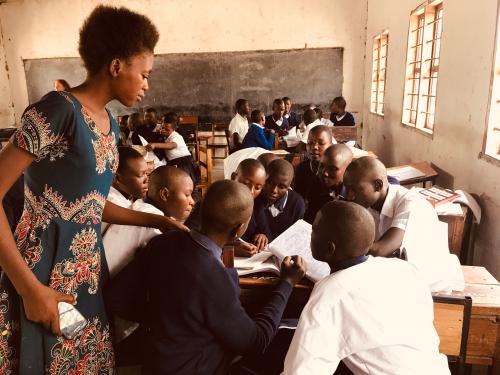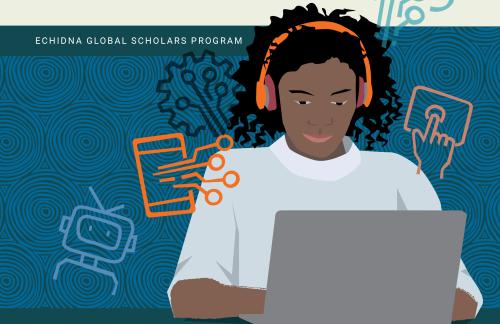These tools are available for download in English, French, and Spanish, and CUE welcomes any thoughts, suggestions, or questions related to them. To share your experience using any of the tools or offer feedback for future editions, please email [email protected].
Deep-rooted, global education challenges that the COVID-19 pandemic has exacerbated—learning inequalities between and within countries, youths dropping out of school, and students in school but not learning—require transforming education systems at large scale to meet all children’s needs. While innovative solutions are being tested in every corner of the world, too many of them remain small. The key question is how to identify, adopt, and adapt what works and bring that to more communities with lasting impact. How can these efforts be effectively, equitably, and sustainably scaled to ensure more children are learning?
In response to these questions, the Millions Learning project at the Center for Universal Education (CUE) launched a series of Real-time Scaling Labs (RTSLs) with local institutions in several countries to generate more evidence and practical guidance for policymakers, practitioners, and funders on how to scale evidence-based education initiatives.
To provide concrete guidance based on key scaling principles and respond to gaps identified through the RTSLs, CUE has developed the following scaling-related tools1 in collaboration with lab partners and other colleagues. Based on empirical research, these resources are designed to foster an iterative, reflective, and data-driven scaling process, with each tool supporting different phases of the scaling journey.
The resources
- Scaling Strategy Worksheet: Planning for scale
- Institutionalization Tracker: Assessing the integration of an education initiative into a system
- Adaptation Tracker: Learning from changes throughout a scaling process
- Real-time Scaling Lab Guidelines: Implementing a participatory, adaptive learning approach to scaling
See also this infographic for an overview of the Millions Learning scaling tools and how they work together.
Scaling Strategy Worksheet: Planning for scale
The Scaling Strategy Worksheet helps implementers, policymakers, and funders articulate a clear, measurable, and timebound scaling goal and high-level strategy.
- How to use: This worksheet is intended to support organizations or institutions planning for or in the process of scaling an education initiative. Developing and refining a scaling strategy is an ongoing process that is best done collaboratively and tailored to local context.
- When to use: This dynamic planning resource should be used throughout a scaling process, revisited and updated periodically based on new insights, data, and changes in the environment. While it is never too late to use the tool, the earlier the better to start planning for scale.
Download the worksheet in English>> | French>> | Spanish>>
Institutionalization Tracker: Assessing the integration of an education initiative into a system
The Institutionalization Tracker helps implementers, policymakers, and funders measure the progress of integrating an initiative into an education system and identify areas that require additional attention for further integration.
- How to use: This tool is designed to track progress toward institutionalization. It is organized by education system building blocks, each of which is broken down into specific elements. For each element, there is a set of criteria to consider when assigning a score ranging from “low institutionalization” to “high institutionalization,” and a column for providing an explanation for the score selected.
- When to use: The tool should be used when the vision for scaling includes government adoption or mainstreaming of an initiative into a formal education system. It should ideally be used at regular intervals (approximately every six months) to assess progress and determine actions to strengthen and advance institutionalization efforts.
Download the tracker in English>> | French>> | Spanish>>
Download the related radar graph>>
Adaptation Tracker: Learning from changes throughout a scaling process
The Adaptation Tracker supports implementers, policymakers, and funders to plan for, document, reflect on, and learn from adaptations made to the model and/or the scaling approach during implementation.
- How to use: This tracker should be used in conjunction with a broader scaling strategy to:
- Identify key challenges or opportunities as they arise during the scaling process and develop a plan to test adaptations in response.
- Implement those adaptations and collect related data.
- Document spontaneous or unplanned changes taking place.
- Reflect on the results and make decisions accordingly.
- When to use: This tool can be used to document and learn from adaptations throughout a scaling process.
Download the tracker in English>> | French>> | Spanish>>
Real-time Scaling Lab Guidelines: Implementing a participatory, adaptive learning approach to scaling
The Real-time Scaling Lab Guidelines help implementers, policymakers, and funders adapt and implement an RTSL process—a participatory, action research approach to collaboratively document, learn from, and support ongoing scaling efforts.
- How to use: An RTSL combines ongoing documentation and analysis of the scaling journey with a series of in-person and virtual convenings and workshops that bring together a diverse group of key stakeholders to collectively plan for sustainable scale; discuss and reflect on data, key challenges, and opportunities faced as they arise; and develop and test adaptations and course corrections to scaling strategies through an iterative learning process. The lab offers concrete opportunities for peer learning and exchange, while also generating knowledge on the “how” of scaling impact.
- When to use: An RTSL can support and learn from a scaling process in multiple ways and at various points in time, including:
- When beginning to plan for scale, launching a scaling process, or entering a new phase of scaling.
- When looking to expand and deepen the impact of an effective initiative and create sustainable change within a system, rather than implement a multiyear project and then move on.
- When looking to learn more about the scaling process, build capacity for scaling and systems change, and document the “how” of the scaling process—not just the end results.
- When the scaling process for an initiative involves multiple stakeholders from diverse sectors, each of whom may have different scaling-related goals or incentives.
Download the guidelines in English>> | French>> | Spanish>>
Infographic: Millions Learning scaling tools overview
This infographic depicts the four scaling tools at a glance and how they complement one another.
-
Acknowledgements and disclosures
The Brookings Institution is a nonprofit organization devoted to independent research and policy solutions. Its mission is to conduct high-quality, independent research and, based on that research, to provide innovative, practical recommendations for policymakers and the public. The conclusions and recommendations of any Brookings publication are solely those of its author(s), and do not reflect the views of the Institution, its management and other scholars, nor the views of its donors, their officers, employees, or Boards of Governors.
Brookings gratefully acknowledges the support provided by the Bernard van Leer Foundation, BHP Foundation, ELMA Philanthropies, Inc. through the Campaign for Female Education (CAMFED), the International Development Research Centre, Canada through the Foundation for Information Technology Education and Development (FIT-ED), the International Rescue Committee, and the Jacobs Foundation.
Brookings recognizes that the value it provides is in its commitment to quality, independence, and impact. Activities supported by its donors reflect this commitment.
-
Footnotes
- VVOB, Educate!, MSI, Pratham, STiR Education, and CUE together developed the “Education Scalability Checklist” to guide the initial design of new education initiatives and then to persistently drive forward the scaling process. This resource can be accessed here: https://www.vvob.org/en/news/education-scalability-checklist-resources. The accompanying blog can be found here: https://www.brookings.edu/blog/education-plus-development/2021/02/24/planning-for-scale-the-education-scalability-checklist/.










